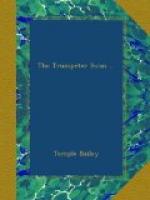She brought the conversation back to Truxton. “Do you remember how we had a picnic here years ago, Mother packed the lunch, and Truxton ate up all the raspberry tarts?”
“He loved tarts,” said the Judge, “and chocolate cake. Well, well, I shall be glad to see him.”
“Perhaps—perhaps when he gets here you’ll be disappointed.”
“Why,” sharply, “why should I?”
Mary did not answer. She stood up with Fiddle in her arms. “Calvin’s coming for the basket,” she said, “and I shall have to go up on the other side—I left the cart.”
She said “good-bye” and crossed by the stepping-stones. The Judge wound up his fishing tackle. The day’s sport resulted in three small “shiners.” But he had enjoyed the day—there been the stillness and the sunlight, and the good company of Bob Flippin and his daughter Mary.
The dogs followed, and Mary from the other side of the stream watched the little procession, Calvin in the lead with the load, the Judge straight and slim with his fluff of white hair, the three little dogs paddling on their short legs.
“Judge Bannister of Huntersfield,” said Mary Flippin. Then she raised Fiddle high in her arms. “Say Granddad, Fiddle,” she whispered, “say Granddad.”
II
The Flippin farmhouse was wide and rambling. It had none of the classic elegance of the old Colonial mansions, but it had a hall in the middle with the sitting-room on one side and on the other an old-fashioned parlor with a bedroom back of it. The dining-room was back of the sitting-room, and beyond that was the kitchen, and a succession of detached buildings which served as dairy, granary, tool-house and carriage house in the old fashion. There was much sunlight and cleanliness in the farmhouse, and beauty of a kind, for the Flippins had been content with simple things, and Mary’s taste was evidenced in the restraint with which the new had been combined with the old. She and her mother did most of the work. It was not easy in these days to get negroes to help. Daisy, the mulatto, had come down for the summer, but they had no assurance that when the winter came they could keep her. Divested of her high heels and city affectations, Daisy was just a darkey, of a rather plain, comfortable, efficient type. When Mary went in, she was getting supper.
“Has Mother come, Daisy?”
“No, Miss, she ain’, an’ yo’ Poppa ain’ come. An’ me makin’ biscuits.”
“Your biscuits are always delicious, Daisy.”
“An’ me and John wants to go to the movies, Miss Mary. An’ efen the supper is late.”
“You can leave the dishes until mornin’, Daisy.”
Mary smiled and sighed as she went on with Fiddle to her own room. The good old days of ordered service were over.




